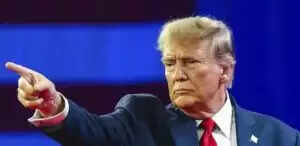Trump's Tariff Threats Spark Trade War Fears Amid Economic Turmoil
Trump's Bold Stance on Tariffs

Washington: President Donald Trump has issued a warning of potential new tariffs on China, igniting concerns that his efforts to adjust the global economic landscape could escalate into a trade conflict.
This warning, shared via social media, follows China's announcement of retaliatory measures against recently imposed U.S. tariffs.
Trump stated, “If China does not retract its 34% increase in tariffs by tomorrow, April 8th, 2025, the United States will impose ADDITIONAL Tariffs on China of 50%, effective April 9th,” on Truth Social. He also declared that all discussions with China regarding their requests for meetings would be halted.
Despite the stock market's significant decline and rising recession fears, Trump has remained steadfast.
He encouraged resilience, stating, “Be Strong, Courageous, and Patient, and GREATNESS will be the result!”
As trading commenced on Monday, the Dow Jones Industrial Average plummeted by 1,200 points, with the S&P 500 nearing a bear market, indicating a 20% drop from its recent peak. Even some of Trump's supporters are expressing concerns about the economic fallout, with forecasts predicting further challenges for U.S. businesses, consumers, and investors.
The Republican president has maintained that his tariffs are essential for rebalancing international trade and revitalizing domestic manufacturing. He accused other nations of exploiting the United States in trade matters, attributing the blame to previous administrations. He specifically labeled China as “the biggest abuser of them all” and criticized Beijing for its retaliatory tariff increases.
Trump has also urged the Federal Reserve to reduce interest rates. On Friday, Federal Reserve Chair Jerome Powell cautioned that the tariffs could exacerbate inflation, indicating that there is considerable uncertainty before any decisions are made.
Investors anticipate that the U.S. central bank may lower its benchmark interest rates at least four times by the end of the year, reflecting that inflation concerns may be overshadowed by fears of layoffs and an economic downturn.
Over the weekend, Trump was in Florida, having arrived Thursday night to participate in a Saudi-funded tournament at his golf course in Miami. He stayed at Mar-a-Lago, his private club in Palm Beach, and played golf at two nearby properties.
On Sunday, he shared a video of himself driving a golf ball and informed reporters aboard Air Force One that he had won a club championship.
“It’s good to win,” Trump remarked. “You heard I won, right?”
He reiterated his commitment to the tariffs despite the global market instability.
“Sometimes you have to take medicine to fix something,” Trump stated.
Goldman Sachs has released a new prediction indicating that a recession is increasingly likely, even if Trump retracts his tariffs. The firm noted that economic growth is expected to slow significantly due to tightening financial conditions, foreign consumer boycotts, and ongoing policy uncertainty, which could hinder capital spending more than previously anticipated.
European Commission President Ursula von der Leyen mentioned that the European Union would seek trade opportunities with countries other than the United States, highlighting the “vast opportunities” available elsewhere.
Trump revealed that he had spoken with Japanese Prime Minister Shigeru Ishiba to initiate trade discussions. He expressed on Truth Social that Japan has treated the U.S. poorly in trade, stating, “they don’t take our cars, but we take MILLIONS of theirs.”
Ishiba conveyed his strong concerns that tariffs could deter Japanese investment in the U.S., which has been the largest foreign investor in the country over the past five years. He described the situation as a “national crisis” and indicated that his government would negotiate with Washington to persuade Trump to reconsider the tariffs.
White House trade adviser Peter Navarro suggested that countries would need to implement more than just tariff reductions to reach agreements, emphasizing the necessity for structural changes in their tax and regulatory frameworks.
“Let’s take Vietnam,” he said on CNBC. “When they come to us and say, We’ll go to zero tariffs, that means nothing to us because it’s the non-tariff cheating that matters.”
On Monday, Trump is set to host the Los Angeles Dodgers at the White House to celebrate their World Series victory. He will also meet with Israeli Prime Minister Benjamin Netanyahu, with a joint press conference scheduled for the afternoon.
Trump has aimed for a unified front following the tumultuous infighting of his first term. However, the economic instability has revealed some divisions within his diverse coalition of supporters.
Hedge fund manager Bill Ackman criticized Commerce Secretary Howard Lutnick on Sunday for being “indifferent to the stock market and the economy crashing.” He noted that Cantor Fitzgerald, the financial firm led by Lutnick before joining the Trump administration, stood to gain from bond investments.
On Monday, Ackman apologized for his remarks but reiterated his concerns regarding Trump’s tariffs.
“I am just frustrated watching what I believe to be a major policy error occur after our country and the president have been making huge economic progress that is now at risk due to the tariffs,” he expressed on X.
Top White House economic adviser Kevin Hassett told a media channel that Ackman should “ease off the rhetoric a little bit.”
He insisted that it is other countries, not the United States, that will “bear the brunt of the tariffs.”
Billionaire Elon Musk, a key adviser to Trump on federal government reforms, expressed doubts about the tariffs over the weekend. Musk stated that tariffs would increase costs for Tesla, his electric vehicle company.
“I hope it is agreed that both Europe and the United States should ideally move towards a zero tariff situation, effectively creating a free trade zone between Europe and North America,” Musk suggested during a video conference with Italian politicians.
He added, “That certainly has been my advice to the president.”
Navarro later responded on a media channel that Musk “doesn’t understand” the situation.
“He sells cars,” Navarro remarked. “That’s what he does.” He further stated that Musk is merely protecting his own interests, as any businessperson would.
